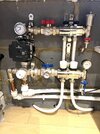I had another heating engineer come over this morning. He examined each of the rooms, radiators, existing pipework and boiler. His recommendation was to go with a Vaillant ecotec plus 430 (30kW) or a Worcester Bosch 8000 35kW boiler. He strongly recommended an aluminium heat exchanger (as opposed to stainless steel) and because I generally heat up the hot water for a couple of hours early morning before the main central heating comes on, he believed a 30kW boiler would be fine.
The H/W does need to be taken into consideration when determining boiler size since it has its own zone value (which the central heating and UFH has too). If a 3-port zone valve was fitted, then the H/W can be ignored when calculating boiler size.
From the detailed examination this engineer carried out and picked out things that others had not (e.g. existing expansion vessel undersized, oversize of existing boiler), I am leaning towards the Vaillant ecotec plus 430
The H/W does need to be taken into consideration when determining boiler size since it has its own zone value (which the central heating and UFH has too). If a 3-port zone valve was fitted, then the H/W can be ignored when calculating boiler size.
From the detailed examination this engineer carried out and picked out things that others had not (e.g. existing expansion vessel undersized, oversize of existing boiler), I am leaning towards the Vaillant ecotec plus 430


